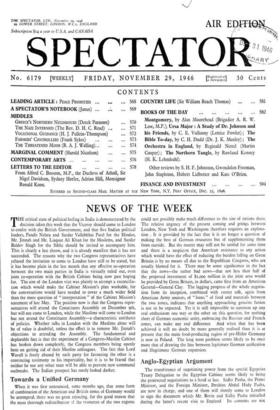Towards a Unified Germany
When it was first announced, some months ago, that some form of combination of the American and British zones of Germany would be attempted, there was no great rejoicing, for the good reason that the most thorough redistribution of the resources of the two regions could not possibly make much difference to the size of rations there. The relative urgency of the present coming and goings between London, New York and Washington therefore requires an explana- tion . It is provided by the fact that it is no longer a question of making the best of German resources but of supplementing them from outside. But the matter may still not be settled for some time and there is a suspicion that American resistance to any action which would have the effect of reducing the burden falling on Great Britain is by no means all due to the Republican Congress, who are usually blamed for it. There may be some significance in the fact that the news—the rather bad news—that not less than half of the proposed investment of $i,000 million in the joint area would be provided by Great Britain, in dollars, came first from an American General—General Clay. The lagging progress of the whole negotia- tion from its inception, combined with recent talk, again from American Army sources, of " loans " of food and materials between the two zones, indicates that anything approaching genuine fusion is not to be expected. Yet it is still impossible to summon up any real enthusiasm one way or the other on this question, for nothing short of German economic unity, embracing the Russian and French zones, can make any real difference. And when that has been achieved it will no doubt be more generally realised than it is at present that the main food-producing region of pre-Hitler Germany is now in Poland. The long term problem seems likely to be once more that of drawing the line between legitimate German unification and illegitimate German expansion.


































